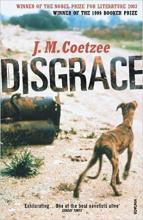
Sunday has come again. He and Bev Shaw are engaged in one of their sessions of Lösung. One by one he brings in the cats, then the dogs: the old, the blind, the halt, the crippled, the maimed, but also the young, the sound – all of those whose term has come. One by one Bev touches them, speaks to them, comforts them, and puts them away, then stands back and watches while he seals up the remains in a black plastic shroud.
He and Bev do not speak. He has learned by now, from her, to concentrate all his attention on the animal they are killing, giving it what he no longer has difficulty in calling by its proper name: love.
He ties the last bag and takes it to the door. Twenty-three. There is only the young dog left, the one who likes music, the one who, given half a chance, would already have lolloped after his comrades into the clinic building, into the theatre with its zinc-topped table where the rich, mixed smells still linger, including one he will not yet have met with in his life: the smell of expiration, the soft, short smell of the released soul.
What the dog will not be able to work out (not in a month of Sundays! he thinks), what his nose will not tell him, is how one can enter what seems to be an ordinary room and never come out again. Something happens in this room, something unmentionable: here the soul is yanked out of the body; briefly it hangs about in the air, twisting and contorting; then it is sucked away and is gone. It will be beyond him, this room that is not a room but a hole where one leaks out of existence.
It gets harder all the time, Bev Shaw once said. Harder, yet easier too. One gets used to things getting harder; one ceases to be surprised that what used to be as hard as hard can be grows harder yet. He can save the young dog, if he wishes, for another week. But a time must come, it cannot be evaded, when he will have to bring him to Bev Shaw in her operating room (perhaps he will carry him in his arms, perhaps he will do that for him) and caress him and brush back the fur so that the needle can find the vein, and whisper to him and support him in the moment when, bewilderingly, his legs buckle; and then, when the soul is out, fold him up and pack him away in his bag, and the next day wheel the bag into the flames and see that it is burnt, burnt up. He will do all that for him when his time comes. It will be little enough, less than little: nothing.
He crosses the surgery. ‘Was that the last?’ asks Bev Shaw.
‘One more.’
He opens the cage door. ‘Come,’ he says, bends, opens his arms. The dog wags its crippled rear, sniffs his face, licks his cheeks, his lips, his ears. He does nothing to stop it. ‘Come.’
Bearing him in his arms like a lamb, he re-enters the surgery. ‘I thought you would save him for another week,’ says Bev Shaw. ‘Are you giving him up?’
‘Yes, I am giving him up.’

Add new comment